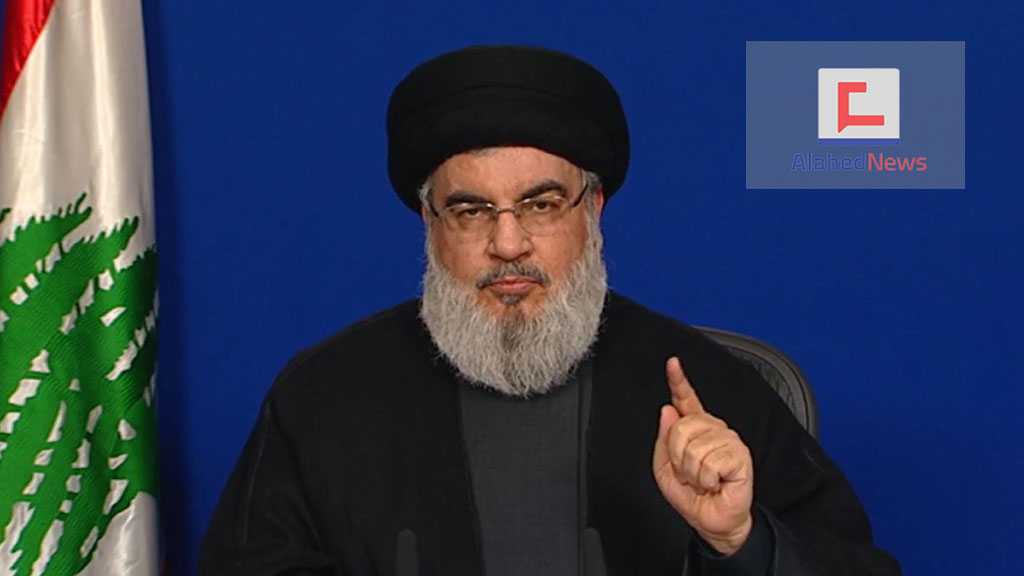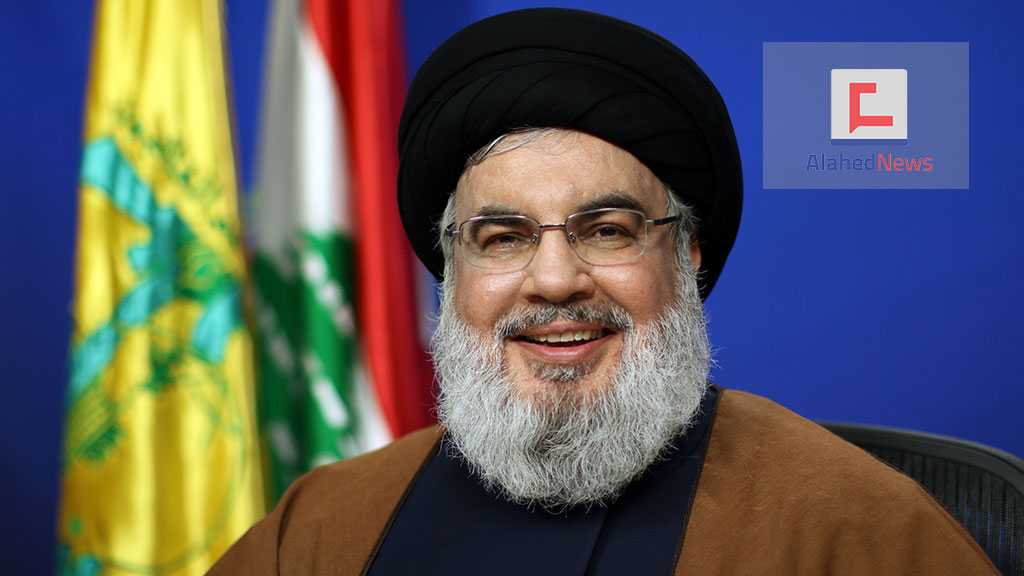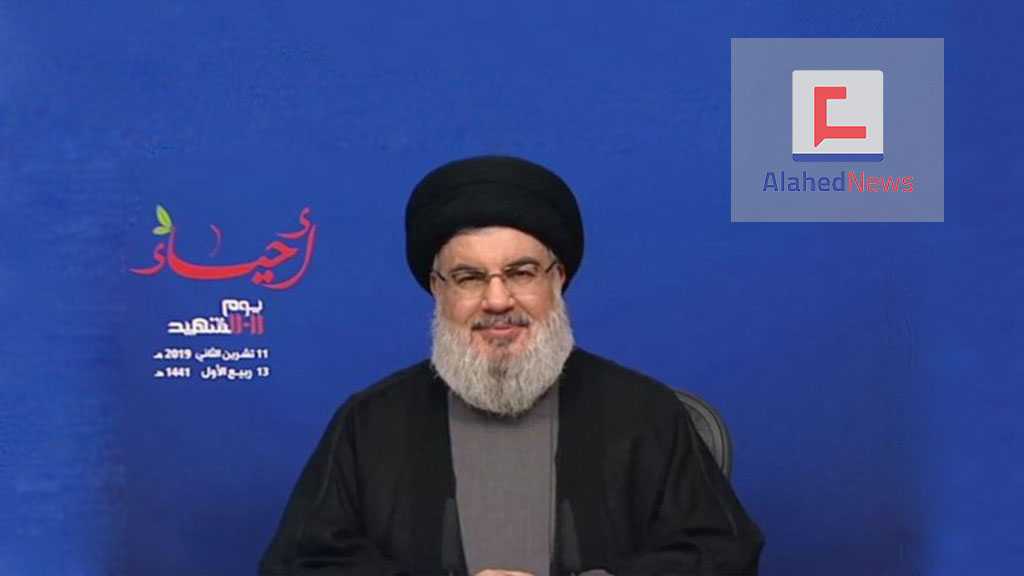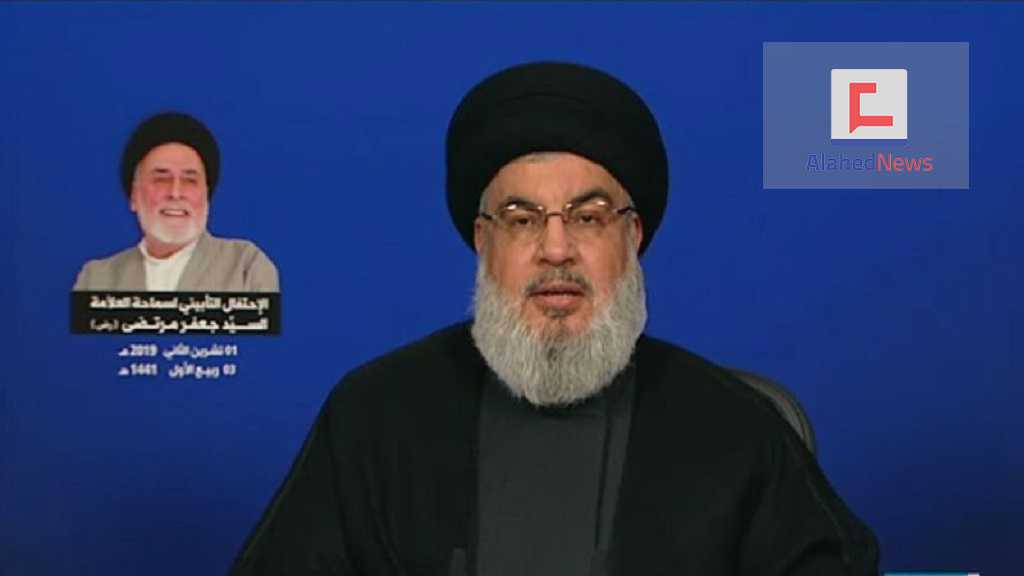
Sayyed Nasrallah: Lebanese Protests Entered Phase of Foreign Intervention, Hezbollah Supporters to Leave Streets

By Zeinab Essa
Beirut - Hezbollah Secretary General His Eminence Sayyed Hassan Nasrallah delivered on Friday a televised speech in which he addressed the internal Lebanese crisis.
At the beginning of his speech, Sayyed Nasrallah warned that Lebanon is passing through a very critical and sensitive situation.
“On Saturday, I said that this popular Lebanese movement isn’t sectarian and that we support it without officially participating in it,” His Eminence recalled, noting that “I said that this popular movement is spontaneous and I expressed great respect to it.”
His Eminence reminded that “I wished that the demonstrators do not carry sabotage actions, insults and clashes with the security forces.”
In parallel, Sayyed Nasrallah called on the demonstrators not to allow the political parties to exploit their movement. “The movement has so far achieved positives that must be preserved,” he claimed, pointing out that “some claimed that Hezbollah and I were threatening the protesters and some believed these claims and the Gulf media and some domestic parties exploited the allegations.”
“One of the positives achieved by the movement is that it forced the government to approve a budget without taxes and fees,” he mentioned, highlighting “under the pressure of the popular movement, the reform paper that PM [Saad] Hariri announced a few days ago was released.”
According to Hezbollah Secretary General, “This reform paper is very important and unprecedented. It is true that it is under the level of ambitions, but it is a very advanced step. There are some people who ridiculed this reform paper. Why was this achievement ridiculed? That's what takes me to a suspicious place.”
“This reform paper is not promises. It’s to be implemented and will not be ink on paper,” he said, pointing out that “one of the most important laws that have been put is returning the looted funds, the draft law on tax evasion and combating corruption.”
Listing more of the advantages, Sayyed Nasrallah said: “One of the most important advantages of the popular movement is raising the awareness among the officials in the authority. The experience of the popular movement has restored confidence and hope inside the people themselves.”
“We have information and data that some forces asked the demonstrators to use insults. Among the positives that the movement has led to is the excellent climate in the country that opens the door to the political forces in the face of corruption,” he added.
Sayyed Nasrallah also stressed that “We will push with other forces to accelerate the adoption of the anti-corruption law, lift bank secrecy, lift immunity and recover the looted money.”
Hailing the latest speech by the Lebanese President Michel Aoun, he viewed that “Aoun opened the door to dialogue and discussion in many titles.”
Meanwhile, he lamented the fact that “Some media outlets have distorted the words of the President.”
“Any solution must be based on the principle of not falling into the vacuum in the institutions and authority,” he confirmed, noting that “If vacuum takes place in light of the economic crisis and tensions in the country and the region, this will lead to chaos and collapse.”
Clearly enough, Sayyed Nasrallah reiterated: “We do not accept toppling the Presidency, the resignation of the government, nor early parliamentary elections.”
“We are protecting the country from the vacuum that will lead to chaos and collapse,” he stressed, noting that “ we’re looking to beyond the further.”
Expressing readiness to protect the country from any dangers, the Resistance Leader said: “Based on our religion and morality we will protect our children and parents. We will protect our people with blood, money and political resistance. We are interested in protecting the country and paying the tax for that.”
“We are here to pay the tax to protect the country politically and the price that we’re paying is less than the blood we’ve offered.”
To the demonstrators, Sayyed Nasrallah said: “Choose your representatives and leadership and set your demands and negotiate under the pressure of the protests. If you want early parliamentary polls, elect your representatives and agreed on an electoral law and we will back you unconditionally.”
Sayyed Nasrallah went on to say: “Blocking roads is a means of civil protest and I do not mind the principle. The dangerous thing that is happening on some roads in addition to roadblocks and humiliation is asking for money and IDs. People want roads to be opened and I appeal to the demonstrators to open them.”
“We refuse that the army opens fire on the demonstrators, but to protect them because we suffered from this in September 1993, Hay Silom and Mashrafyieh,” he reminded, urging the state to bear its responsibility in protecting the people’s properties.”
According to His Eminence, “What started spontaneously is no longer spontaneous. Today, this movement with its daily activities and slogans is no longer a spontaneous popular movement.”
“There is clear funding for the movement from certain and different parties known by their personalities,” he cautioned.
To the leaders of the movement, Sayyed Nasrallah raised the doubts: “From where is this money and funding?”
“The demands that are being raised today are not those of the poor,” he warned, cautioning that “there is a movement that is preparing a paper to request from the UN Security Council to submit Lebanon to Chapter VII. Some squares are being used to target the resistance’s weapon.”
Moreover, Hezbollah Secretary General attacked “some political forces are exploiting the popular wave to achieve goals that vary from one political group to another.”
“To achieve the objectives of the demonstrators, we must determine who represents them. There is an unclear and undeclared leadership of the movement,” he said, noting that “among the groups that lead the movement is a national and honest group. However, at the same time, there is another group of known political parties that were in power.”
On another level, Sayyed Nasrallah unveiled that “There are groups in the popular movement that are associated with foreign embassies. There are those who are looking for political revenge and settling accounts. I have names of all these groups.”
“Do the demonstrators want to replace a corrupt with another or a failure with another one?” he questioned, noting that “Popular revolutions usually offer clear choices and alternatives.”
His Eminence further called on “those who consider themselves leaders in the movement to take the initiative to the judiciary to reveal their banking secrecy.”
“If there is a non-sectarian and non-regional alternative, we are all ready to support it. We now know that the situation in Lebanon has entered the circle of regional targeting, using internal actors,” he said.
To the Lebanese people, Sayyed Nasrallah sent the advice: “Do not believe what the embassies say because what is important is what they are doing.”
Expressing fear that “ We are not afraid for the resistance, but for the country,” His Eminence disclosed that “there are data and doubts about the existence of efforts to drag Lebanon into civil war.”
At the end of his televised speech, Sayyed Nasrallah urged Hezbollah supporters to refrain from joining the protests. “Leave the squares to those who are convinced of it and we respect all convictions. There is no need to defend the resistance in these squares.”


